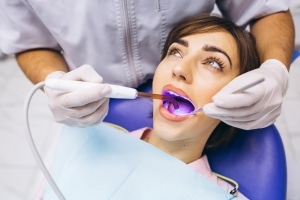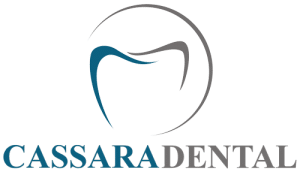Tooth Extraction in Mountain View, CA

Reasons for Tooth Extractions
Sometimes a tooth is so badly damaged or decayed that it cannot be preserved or repaired. Tooth extraction is often recommended in these cases. Here are some other scenarios that might call for a tooth extraction in Mountain View:
- Infection: If tooth decay leads to an infection that spreads to the pulp inside the tooth, an extraction may be necessary. The best option would be a root canal to remove the infected pulp, but if the infection is too severe, a tooth extraction is needed to prevent the infection from spreading to other teeth.
- Periodontal disease (gum disease): A severe case of gum disease can cause a tooth or several teeth to loosen in the mouth. A tooth extraction might be needed in order to treat the gum disease.
- Crowded Teeth: If a tooth is unable to break through the gums (erupt), Dr. Cassara will sometimes extract a tooth that is in the way. Tooth extraction is also sometimes required as a preparation for orthodontic procedures (straightening the teeth). If a patient’s teeth are too big for the mouth, the orthodontic procedure may not be possible until after an extraction.
Tooth Extraction Procedure

If a tooth is impacted, Dr. Cassara will use a forceps to grasp the tooth and rock it back and forth to loosen it from the jawbone and surrounding ligaments. If a tooth is especially difficult to extract, Dr. Cassara will remove it in several pieces, which is a procedure called “sectioning.”
A blood clot usually forms in the socket where the tooth is removed. Sometimes stitching is required following a tooth extraction. If the blood clot breaks loose, it can cause an extremely painful condition known as “dry socket.” Dr. Cassara will need to place a sedative dressing over the socket if this happens, which will remain in place until a new blood clot forms.
Tooth Extraction After-Care
- Take the painkillers prescribed by Dr. Cassara
- Applying ice packs for 10 minutes can reduce swelling at the extraction site
- Rest for 24 hours after the extraction; limit activities for another two days
- Avoid rinsing, spitting forcefully or drinking through a straw for 24 hours
- Eat soft foods the first day after the extraction
- Do not smoke
If you have a painful tooth and you are concerned that it may need to be extracted, contact Dr. Cassara’s office in Mountain View today. You can schedule an appointment by calling 650-969-2866.

